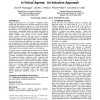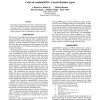283 search results - page 7 / 57 » Modelling socially intelligent virtual humans |
ATAL
2008
Springer
13 years 10 months ago
2008
Springer
In this paper we study tools for conviviality to develop user-friendly multiagent systems. First, we show how to use the social-cognitive concept of conviviality in multiagent sys...
IPPS
1998
IEEE
14 years 29 days ago
1998
IEEE
The paper presents how the Random PROLOG Processor (RPP), a bio-inspired model of computations, can be used for formalization and analysis of a phenomenon - the Collective Intelli...
ATAL
2008
Springer
13 years 10 months ago
2008
Springer
Humans continuously assess one another's situational context, modify their own affective state, and then respond based on these outcomes through empathetic expression. Virtua...
AAAI
2000
13 years 10 months ago
2000
We describe our development of Cobot, a software agent who lives in LambdaMOO, a popular virtual world frequented by hundreds of users. We present a detailed discussion of the fun...
ACMACE
2007
ACM
14 years 22 days ago
2007
ACM
Recently a new generation of virtual worlds has emerged in which users are provided with open-ended modelling tools with which they can create and modify world content. The result...



